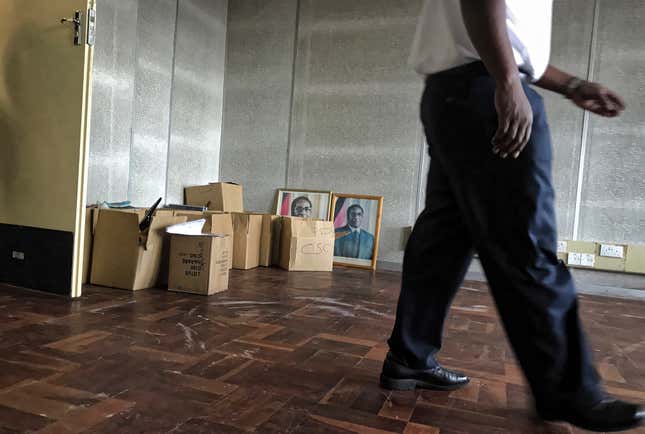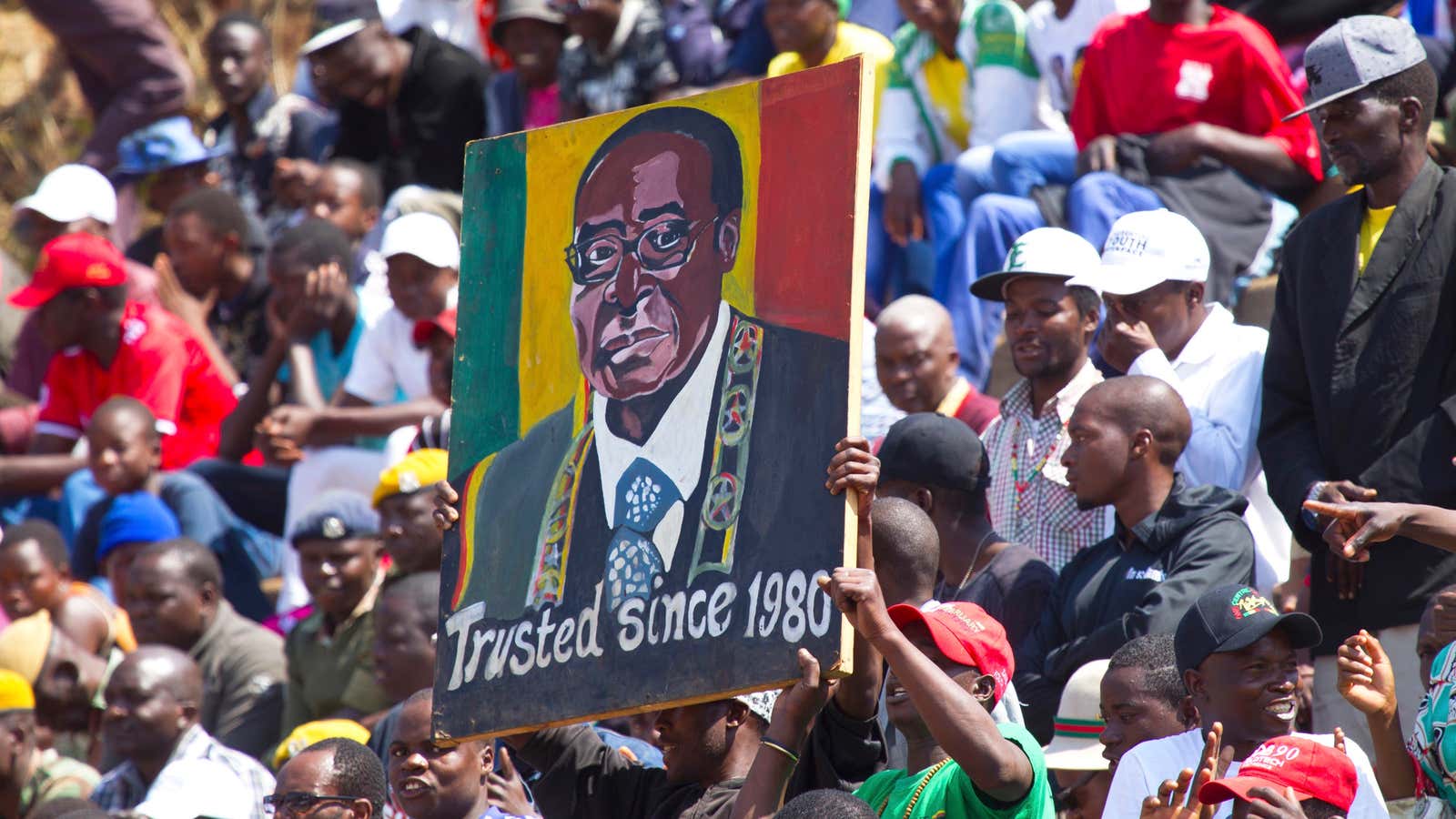Slight of frame with large rimmed glasses, Robert Mugabe may not look like a typical authoritarian, except, perhaps, for his insistence on shaving his moustache in the style of Adolf Hitler. And yet, the former teacher-turned liberator has loomed over Zimbabwe for so long it has become almost impossible to imagine anyone else in his place, even though that has been a dream for years for so many.
When tanks rumbled into Zimbabwe’s usually subdued capital Harare on Nov. 14, they brought with them change that at once felt both sudden and inevitable. It was a change that could only have been wrought by those close to Mugabe: a 37 year-long rule abruptly ended his once-loyal army and his axed vice president.
At 93, Mugabe has been so inextricably linked with power in Zimbabwe that his loss of it has launched a flurry of obituary-like profiles (yes, like this one). But the coup—even though the army continues to deny it is one—likely didn’t surprise those those familiar with how he came to power.
The Teacher
Mugabe’s birthday, Feb. 21, has been marked for years by a boisterous youth movement with lavish parties. But his beginnings were much more modest. He was born in 1924, the third child of a carpenter and catechism teacher, in the Matibiri village in the Zvimba district of what was then known as Southern Rhodesia. The family was impoverished, and his father left when he was only 10.
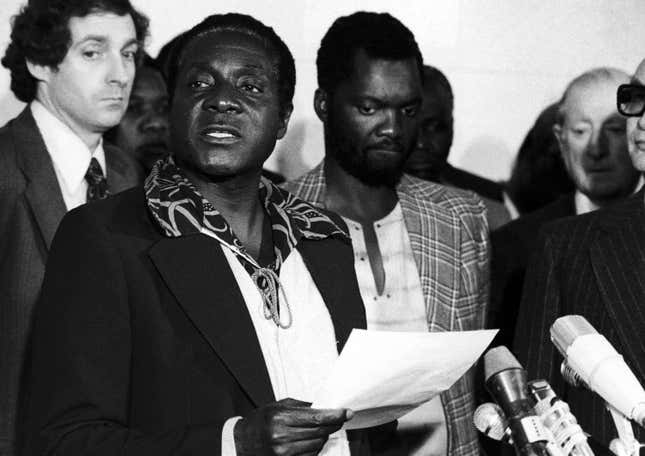
Mugabe was a gifted student and his education was supported by missionary teachers. He became a teacher to support his family, which influenced his later decision to prioritize education after independence (as president, he would go on to spend nearly eight times more on education than neighboring countries). At 25, he received a scholarship to attend the University of Fort Hare in South Africa, the alma mater of several of southern Africa’s liberation icons, including Nelson Mandela. There Mugabe mingled with activists Julius Nyerere and Kenneth Kaunda, who would later be elected presidents of Tanzania and Zambia respectively.
After his introduction to Marxism and pan-Africanism at Fort Hare, Mugabe moved to Ghana, the first African country to achieve colonial independence. While teaching high school and completing a Bachelor of Administration degree, he met with independence-era president Kwame Nkrumah. He also met his first wife, Sarah Francesca Heyfron. The couple were married from 1961 until her death of kidney failure in 1992.
The Liberator
Mugabe returned in 1960 to a Zimbabwe where black people’s rights were rapidly shrinking under a group of right-wing white leaders. His political legacy is built on his opposition to this minority rule. As a secretary of the National Democratic Party and editor of the party’s newspaper, The Democratic Voice, he first began to agitate for black rule in the early 1960s. He later joined the Zimbabwe African People’s Union, led at the time by Joshua Nkomo. Mugabe and other activists were subsequently jailed by then-Prime Minister Ian Smith, notorious for running in 1964 under the ticket of “a whiter, brighter Rhodesia.”
In jail, Mugabe split from Nkomo to become the leader of the Zimbabwean African National Union (Zanu). He was released in 1974, unusually, at the insistence of South Africa’s apartheid government, and allowed to attend a conference in Zambia. From there, he escaped to Mozambique to join the Zimbabwe African National Liberation Army, which was facing off against the colonial government in what came to be known as the Rhodesian Bush War, or Chimurenga (Shona for “revolutionary struggle”). This fierce series of battles, from 1964 to 1979, saw at least 20,000 people killed. It ultimately led to victory (pdf) for the liberation army in the form of the country’s first democratic elections, which Mugabe’s Zanu won in a landslide.
It is these struggle credentials that many around the continent cling to when they laud Mugabe. But in doing so, they have turned a blind eye to the continued suffering of Zimbabweans. Mugabe also frequently used his past, and the spectre of white, Western influence, to remind Zimbabweans where their true freedom comes from. His paranoid, conspiratorial quips about Western leaders like George Bush and Tony Blair are often reported on by international outlets. Less so the fact that thousands of Zimbabweans now face starvation and that half the country has no access to proper schooling.
Like Mugabe, many Zimbabweans blame his tainted legacy and the country’s economic collapse on European and US sanctions (it doesn’t help of course, that the only time the West has properly intervened was when white Zimbabwean farmers were in danger). Mugabe, however, has always been problematic.
The Autocrat
The president’s political career has long been characterized by clashes in which he has emerged the victor, beginning with his disagreements with Nkomo. Soon after independence in the early 1980s, the country came to the brink of civil war. Ethnic divisions between Shonas and Ndebele were manipulated by factions loyal to Nkomo, an Ndebele, and Mugabe, his former aide and a Shona. This conflict culminated in the Gukurahundi massacre, in which an unsubstantiated number of Ndebele people were killed by rival Shona.
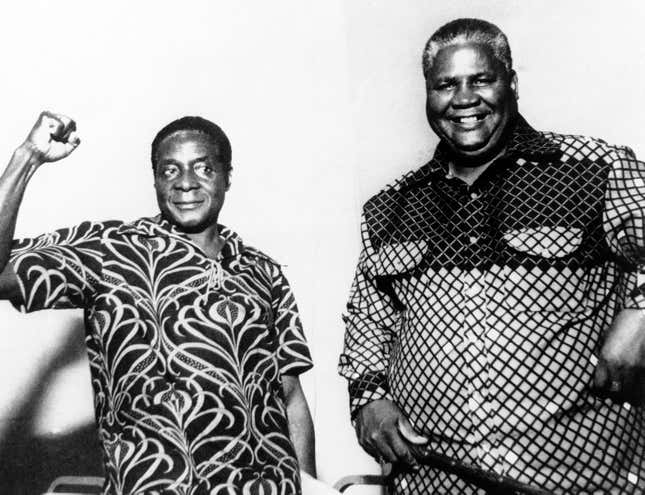
“People always suggest that there was something that turned Mugabe. I don’t believe that. The man was always a killer,” said Michelle Faul, a veteran journalist speaking to Slate. Faul was driven from her home in Zimbabwe in the 1980s after her coverage of the massacres unnerved Mugabe.
Nkomo fled for his life, but returned to serve as deputy president after his party joined with Mugabe’s to form Zanu-PF. He died a muted figurehead (paywall) in 1999.
Mugabe’s firing of deputy president Emmerson Mnangagwa in early November was the continuation of a well-proven strategy for the president of pushing out prominent politicians threatening his grip on power. The fate of some of these politicians has raised questions, such as the 1975 assassination of Herbert Chitepo, one of the key figures of the Zanu liberation army, and the more recent mysterious death of Zimbabwe’s military chief general, Solomon Mujuru, known as Rex Nhongo, in 2011.
The oppressor
As his hold over Zimbabwe deepened, Mugabe sacrificed his country’s economy to maintain power. After independence, Zimbabwe was the exemplar for post-colonial Africa. A landlocked country without the natural resources of some its neighbors, Mugabe’s government built a self-sufficient economy. Its agricultural sector earned the country the nickname “Africa breadbasket” and the public education system led to one of the highest literacy levels on the continent. Today, Zimbabwe doesn’t even have its own currency. Western sanctions have much to do with the country’s inability to recover, but Mugabe’s populist policies haven’t helped.
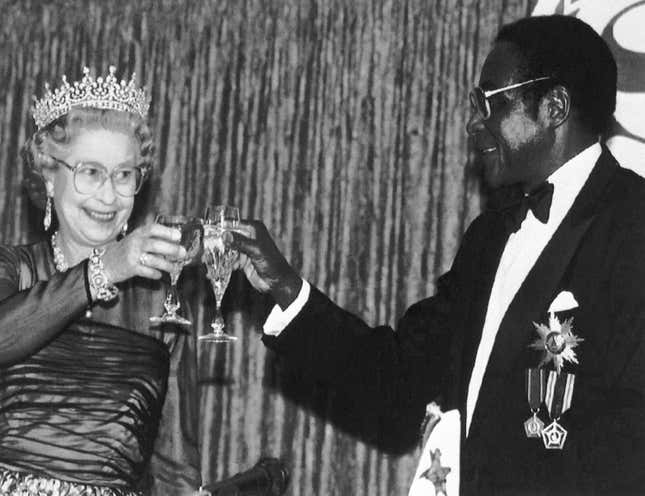
Mugabe was not always a pariah to the west, and was even knighted by Queen Elizabeth II in 1994. He was stripped of this title in 2008 after turning on Zimbabwe’s white famers, violently evicting them and handing over their land to disenfranchised war veterans. Agricultural production plummeted as farmers fled to neighboring countries. Recovery took at least a decade.
As the country’s glory faded, the government became increasingly accused of human rights abuses. Critics are regularly jailed, and the whereabouts of some activists, like Itai Dzamara, are still unknown. In 2008, artisanal miners were massacred to secure the recently discovered but desperately needed Marange diamond fields. Young Zimbabweans who take to the streets to oppose the only leader they have known face a violent response by police. These abuses are all well documented and have isolated Mugabe in the west. Yet he maintains liberation hero status in many parts of Africa.
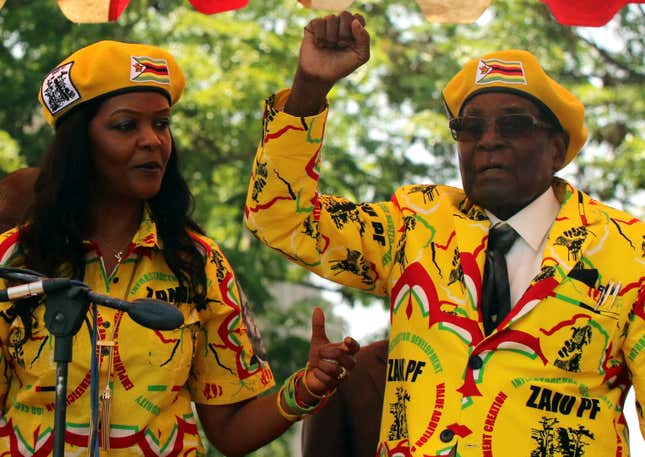
Mugabe remarried in 1996. It was perhaps this moment that has most directly led to his downfall. As Zimbabwe’s fortunes worsened, those of Grace Mugabe, nicknamed “Gucci Grace” and the“First Shopper” for her elaborate shopping sprees, rose. The first lady soon began to show interest in succeeding her husband, and recent years, her utterances and behavior showed that she was accountable to no one.
She was recently accused of assaulting a South African model in Johannesburg and faced no consequences. A few years earlier, she was accused of assaulting a photographer in China. She insulted Mugabe’s rivals, including former vice president Joice Mujuru, who was later expelled from the party.
For a country that for years has withstood the violent legacy of colonialism, a ruined economy, an unstable society, and an uncertain future, the elevation of Mugabe’s wife was a step too far. Her so-called “bedroom coup,” which resulted in Mnangagwa’s axing earlier this month, appears to have been the final straw. She is believed to have been detained with her husband.
In years past, rallies starring the Mugabes have filled out stadiums in Zimbabwe, especially in the rural areas. Usually dressed in a suit featuring his own image, Mugabe could talk for hours, delivering zingers in Shona and English to laughing crowds dressed in T-shirts and wraps emblazoned with his face. Now though, there are no crowds defending him, and in Harare’s quiet streets, for the first time in four decades, no one is chanting his name.
